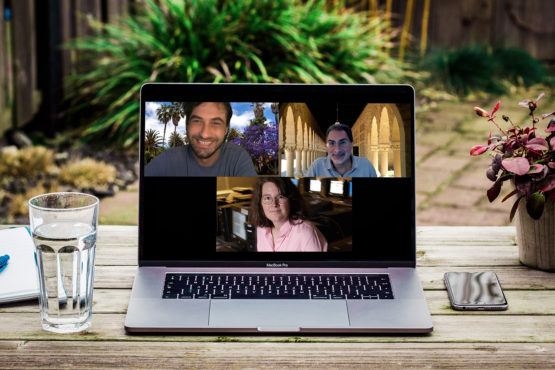Famous Stanford coding course seeks to repeat success of novel model of online learning
Stanford tries a new model for online learning. A free version of a popular intro to coding course is being offered for the second time this spring. The secret ingredient was the largest group of teachers for a single class. You can teach too! Applications are open.
When Stanford University computer science faculty members Chris Piech and Mehran Sahami were unable to teach in person due to shelter-in-place orders, they were compelled to reimagine one of Stanford’s most popular courses for a broader online audience. They called the new course “Code in Place,” and in one month, it enabled over 10,000 students in 120 countries to learn computer programming from 900 volunteer teachers – likely the most teachers who have ever taught a single class.

(Clockwise from left) Stanford faculty Chris Piech and Mehran Sahami and senior lecturer Julie Zelenski will lead “Code in Place,” a free online intro to coding course that is being offered for the second time since the coronavirus pandemic began. (Image credit: Andrew Brodhead)
“The Code in Place community was incredibly warm and supportive. The students and volunteer section leaders were very engaged and really encouraged each other to succeed,” said Sahami, who is the James and Ellenor Chesebrough Professor in the School of Engineering and professor of computer science. “Just reading the online discussions brought a smile to my face every day. Being part of it was an amazingly positive experience.”
Piech and Sahami built Code in Place off the first half of CS 106A, “Programming Methodology,” which is one of the most popular courses at Stanford and teaches the fundamentals of computer programming through the widely-used Python programming language. To offer these lessons online, they created a new kind of virtual classroom experience focused on “human-centered learning.”
“It was exciting to be part of such a new model for online learning,” said Piech, who is an assistant professor of computer science. “In Code in Place, we made thousands of robust learning communities called ‘sections,’ modeled after the very best part of CS106A. It just felt like a beautiful vision for how online learning could be truly human. We reimagined who gets to play the role of teacher. And it worked.”
In a paper detailing Code in Place – which was published March 3 as part of the 52nd ACM Technical Symposium on Computer Science Education (SIGCSE ’21) – Piech, Sahami and their co-authors described this as “a model built around a community that stresses learning for all, the importance of kindness and peer support.” The volunteer teachers who acted as section leaders and led interactive weekly sections with up to 10 students, were crucial to delivering on those promises, said Piech and Sahami.
“Most of the section leaders were not professional teachers, but programmers in the industry or advanced university students,” said Piech. “They were learning the artform of teaching. And they were inspiring to their students.”
Now, the team – with Julie Zelenski, senior lecturer in computer science, joining as an instructor – is looking to repeat their success. Code in Place will run again from April 19 to May 28. Applications for section leaders are open now until March 25.
“I loved getting to interact with and have an impact on people in far-flung locales,” said an instructor who led a Code in Place section last spring and plans to do it again this year. “It makes the world feel smaller and more connected, and shows how much we have in common.”
Applications for students will be also open, from April 2 to April 8. The course is for people from any discipline and requires no previous programming knowledge. It consists of weekly lecture videos, a 50-minute interactive section (led by a vetted teacher volunteer) and four assignments. The instructional team also encourages online discussion beyond assigned sections to take advantage of the large, diverse, international Code in Place community.
“The success of Code in Place shows that it really can be possible to scale education in a way that’s effective and motivating by incorporating both the broad reach of technology and the compassion and humanity of people helping each other,” said Sahami.
To read all stories about Stanford science, subscribe to the biweekly Stanford Science Digest.
